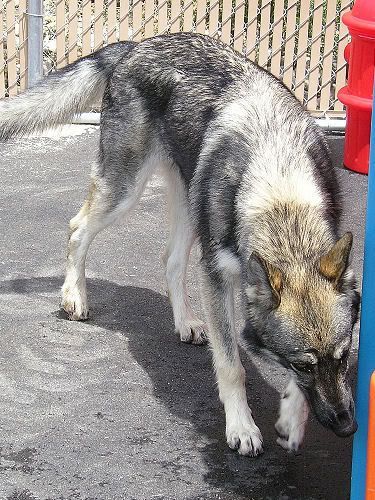There is a lot of confusion about hybrids... and to be honest, it's hard to say anything in specific about hybrids because there are so many different "levels" of hybridization - from subspecies, to species within the same genera to species outside of their genera, and rarely, outside of their family.
Do I condone the act of hybridization? No, cause I don't like to see it, on any level! But, hybrids still interest me! A LOT! My reply will take several posts and it will be long... but I hope it is of interest!
Not having a go at you Yazzmin but I''ll be honest here I have really strong feelings regarding x-breeding different species/breeds of anything & don't apologise if this upsets anyone. Why humans want to bugger around with every animal by x-breeding them begiles and annoys the hell out of me (polite version), we are not god they are the way they are for a purpose, they don't survive in the wild if they do happen to xbreed.
Just look at what happens in the dog showing/breeding world and the breeds of dogs that are bred knowningly with defects, but hey, it looks good & these dogs have to live with the defects. And to be honest I don't have alot of time for people who buy the x's either. The only reason xbreeding occurs is it makes MONEY for the breeder, it has jack to do with any benefit for the bird/dog/animal. IMHO
There are a lot of hybrids out there that people don't even realize are hybrids. Many people unintentionally hybridize birds without realizing it, both on a subspecies as well as a species level. This isn't about playing "God" - it's about being plain ignorant. Money is also another factor, yes. Imagine if you are a big time breeder with huge aviaries of different species reproducing, and all you produce are pure birds. Now, your customers are pretty satisfied with your birds, but what if they suddenly decided they wanted the option to buy hybrids as well? You can either refuse to sell hybrids to your loyal customers, forcing them to go elsewhere (which may also result in them purchasing from other buyers their pure species) or you can fill that need and start producing hybrids. Do I agree with it? No, but from a business stand point, it makes sense to supply your customers with what they want - as long as what you produce is healthy.
Contrary to popular belief, hybrids do occur in nature. And they do survive. And they do reproduce. There are hybrid swarms and hybrid rings. Now, we can argue whether or not the hybrids in the wild are naturally occurring or not due to human encroachment, but the point stands, they do occur. In parrots, we have the Adelaide Rosella, which is a hybrid between a Crimson and Yellow Rosellas. Depending on the region that the Adelaides are from will depend on their colorations. They range from the reds of the Crimsons, to the oranges which are the result of the two species hybridizing to the yellows of the Yellow's. It really depends on which species is more prominant within the hybrid offspring. Another example? Lorikeets. Apparently, Rainbows, Musks and Scalys have been hybridizing two and three ways.
You can see some examples of the hybrid lorikeets in the following link (photos of both wild birds and a captive one)
Flickr: Search Hybrid Parrots
And the following link describes ring species and how gulls have been naturally hybridizing with other gulls.
Ring species - Wikipedia, the free encyclopedia
I've also personally noticed an increase in hybrid ducks and geese at ponds - although I believe this is more to idiots letting their domestic waterfowl loose in said ponds when they no longer want to or can care for their animals, and these birds in turn are reproducing with the wildlife.
Another member mentioned cockatoos hybridizing in the wild. There are several photos of such hybrids and occasionally an interesting word or two about such hybrid offspring.
There's also a few polar bear x grizzly hybrids that have been shot and killed - in the wild. I don't know if any of these hybrids have reproduced, though. Reading the following article I just found, I'm going to guess that they probably are.
Surge of hybrid polar-grizzly bear sightings befuddle scientists | Alaska Dispatch
As far as hybridizing being unhealthy for the offspring - that's not always true. It really depends on how closely related the parents are. The closer the parents are, the higher chance of healthier offspring. In fact, done right, hybrid offspring can be healthier than the parents due to the multitude of genes.
There is hybrid vigor (a term I've heard multiple times supposedly coined by dog breeders), which is where the offspring are healthier than the parent species, then there is outbreeding depression. Hybrid vigor is strongest in first generation offspring and less so in future offspring - unless you bring in a third, or fourth species into the mix. It's all about the amount of genetic diversity that's "available", and whether or not those genetics may benefit the birds. It shouldn't matter in captivity, but who knows.
Wikipedia on Hybrid Vigor
Heterosis - Wikipedia, the free encyclopedia
and Outbreeding Depression
Outbreeding depression - Wikipedia, the free encyclopedia
Short one on Hybrid Swarms - which is what the Adelaide Rosella population is
Hybrid swarm - Wikipedia, the free encyclopedia
An interesting species - the Whiptail Lizard. Some reproduce via parthenogenesis and others do not. In other words, the entire species of those that reproduce via parthenogensis are female. Males do not exist. Females fertilize their own eggs (aka unisex), although it still requires at least two females for this to occur. And it is also believed that these species are the result of hybridization. (parthenogenisis has occured in other species, but that's going OT some)
Teiidae - Wikipedia, the free encyclopedia
I know it may sound like I'm arguing that hybridization is "ok", but truth is, I can argue either side of the coin! I don't like to see it happen, but I'm also saying that, if you do it right, it's not that bad. I'd personally rather see a responsible hybrid breeder than an ignorant one. That is, one that purposely produces hybrids that do not appear like pure species and sells the offspring as what they are; hybrids. I *DON'T* want to see someone stick two birds together that appear similar but are two different subspecies/species and then sell the offspring as pures. Sad thing is, this occurs frequently.
I have not heard of any health problems in subspecies hybrids in eclectus, conures, senegals, cockatoos and amazons. In species to species, I have not heard of any health problems in Alexandrines x Indian Ringnecks, Rosella Hybrids and Lorikeet hybrids. For that matter, I can't think of any in Amazons and African Greys. I *have* heard of health problems in Cockatoo, Macaw, Lovebird and Conure hybrids though.
I'm not trying to change your opinion on hybrids, only merely trying to "open up" your brain, since hybridization isn't as black and white as many people seem to think it is. I used to think the same way as I was led to believe that all hybrids are bad and that all hybrids have issues, but that's not always the case. I hope the information in this post may help broaden your view on the topic of hybridization.









